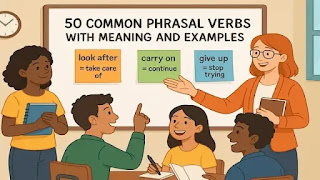What are the 50 Phrasal Verbs with Meaning and Examples?


Mastering vocabulary is one of the most important steps toward speaking any language fluently, and English is no exception. With a rich vocabulary, you can confidently express yourself, hold conversations, and understand native speakers more easily. This guide will introduce you to 1500 essential words that will enhance your English fluency. Plus, you'll learn practical strategies for remembering and using these words effectively.
These words are organised into different categories to cover a variety of everyday situations, from basic expressions to more advanced vocabulary. Let’s dive into the words that will transform your speaking skills!
Here are some fundamental words you'll use every day:
These verbs will help you describe actions and talk about what’s happening around you:
Adjectives are crucial for describing things and people. Start with these:
These words are essential for asking questions and gathering information:
Politeness is key in any language. These phrases will help you sound respectful and kind:
If you’re using English in a work environment, these words will come in handy:
When eating out or talking about food, these words are essential:
Whether you’re travelling for business or pleasure, knowing these words will make things easier:
In today’s world, technology is part of daily life. These words will help you talk about it:
For conversations about health or describing symptoms, these words are helpful:
Whether you’re shopping for clothes or groceries, these words will help:
Talking about time and dates is a common part of conversation. These words will make it easy:
Expressing how you feel is important in any language. Use these words to talk about your emotions:
The weather is a common topic of conversation. These words will help you describe it:
These words are useful when talking about different modes of transport:
Talking about things around the house? These words are essential:
Describing colors is important when talking about objects, clothes, or other items:
Talking about numbers and amounts is part of daily life:
Prepositions help describe where things are or how they relate to each other:
Expressing deeper emotions and moods:
These phrases help maintain politeness in conversations:
Use these words to give or ask for directions:
Talk about hobbies, fun activities, and entertainment with these words:
Discuss family members and relationships with these terms:
Talking about the natural world? These words will be useful:
Now that you’ve got a solid list of 1500 words, how do you learn and retain them? Here are some tips to help you:
Use Word Families: Learning related words together helps you remember them. For example, with “create,” you can also learn “creation,” “creative,” etc.
Learn Collocations: Words that commonly go together (like "make a decision") will make your speech sound more natural.
Use Vocabulary Apps: Apps like Anki or Quizlet can help you review words regularly.
Listen to English: Podcasts or audiobooks in English will help you learn new words in context.
Practice with a Speaking Partner: Engaging in conversation reinforces your vocabulary.
Write Daily: Keep a journal and try using new words in your entries.
Use Mnemonics: Create associations or mental images to help you remember words.
Read Regularly: Reading exposes you to new vocabulary in context.
Building a strong vocabulary is key to speaking English fluently. By learning these 1500 essential words, you’re setting yourself up for success. Remember, learning a language is a journey—so be patient and keep practicing!
For more
Comments
Post a Comment
Please Don't Enter Any Spam Link In The Comment Box.